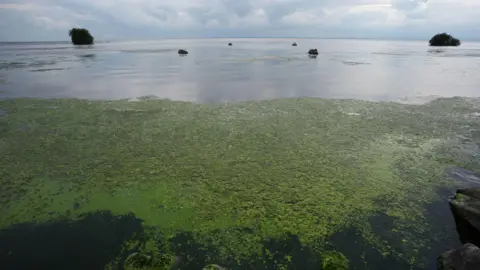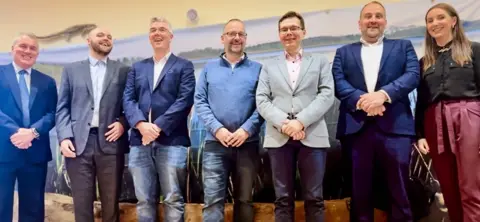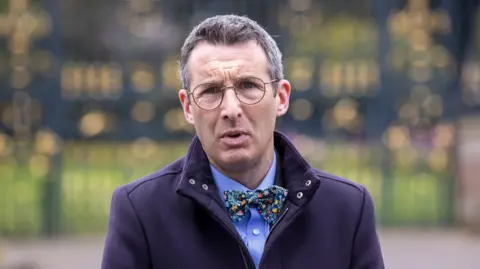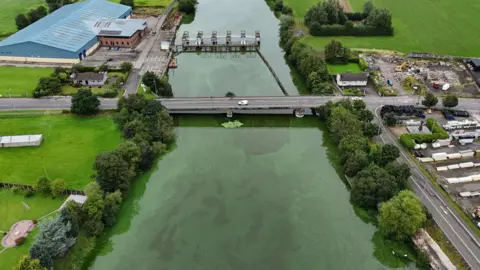£450k allocated to tackle Lough Neagh algae
 PA Media
PA MediaFive suppliers have been selected in the first phase of an initiative to tackle blue-green algae in Lough Neagh.
They have each been awarded a share of £450,000 to develop proof of concepts to treat, reduce and suppress algal growth.
Up to three will proceed into a second pilot solution phase next year.
Any proposed solutions must not have a negative impact on the natural environment of Lough Neagh or its associated waterways.
Blue-green algae is a big problem in Lough Neagh - last year saw the worst bloom since the mid-1970s.
Blue-green algae, technically known as cyanobacteria, is a collection of microscopic organisms that are naturally present in lakes and streams.
Under certain conditions, blue-green algae can become abundant in warm, shallow, undisturbed, nutrient-rich surface waters that receive a lot of sunlight.
When this occurs, blue-green algae can form blooms that discolour the water, or produce floating mats or scums on the water’s surface.
Who are the five suppliers?
 Daera
Daera- Clear Water Systems Ltd – a Belfast-based company carrying out research and experimental development on biotechnology
- Helix8 Ltd – a management consultancy and software development firm in Larne
- Queen’s University Belfast – academic institution with scientific research interests
- Varicon Aqua Solutions Ltd – a Worcester-based company specialising in aquaculture
- Wholeschool Software Ltd (Biild) – a Belfast education technology company
More than 50 applications were received in the Lough Neagh: Blue-Green Algae Small Business Research Initiative competition (SBRI), run by the Department of Agriculture, Environment and Rural Affairs (Daera) and the Department for the Economy.
Daera said the bidders cover several areas, including the use of ultrasonics, mechanical treatment and biological treatment.
Environment Minister Andrew Muir welcomed the successful applicants but said the SBRI initiative was just one of 37 elements in the Lough Neagh Action Plan.
 PA Media
PA Media"There is a significant amount of work to do to restore the lough and enhance water quality throughout Northern Ireland," he said.
"This will take both time and resources.
"Water quality issues at Lough Neagh and elsewhere were decades in the making and will take decades to fix."
Mr Muir said it was his vision to have a "healthy, resilient environment with high water quality status".
"I am firmly committed to take the necessary action to make a difference to our waterways," he added.
The announcement of the successful bidders was also welcomed by Economy Minister Conor Murphy.
The next phase of the competition is expected to open in summer 2025.
What is blue-green algae and is it harmful?
 PA Media
PA MediaBlue-green algae, technically known as cyanobacteria, is a collection of microscopic organisms that are naturally present in lakes and streams.
Under certain conditions, blue-green algae can become abundant in warm, shallow, undisturbed, nutrient-rich surface waters that receive a lot of sunlight.
When this occurs, blue-green algae can form blooms that discolour the water, or produce floating mats or scums on the water’s surface.
Exposure to high levels of any blue-green algae blooms - whether by contact with water blooms, swallowing that water or inhaling airborne droplets - can cause health effects in people and animals.
You can learn more about blue-green algae by reading our explainer here.